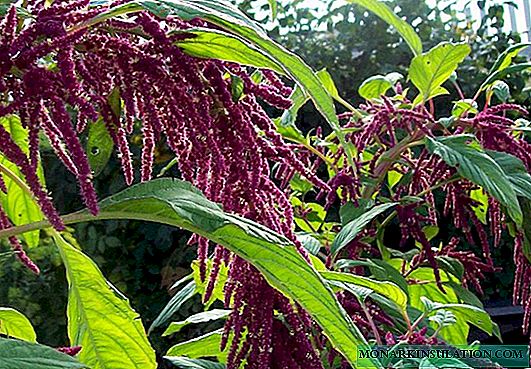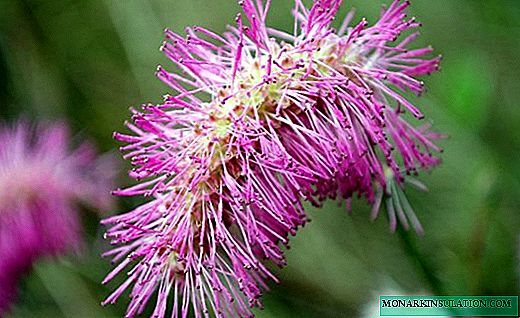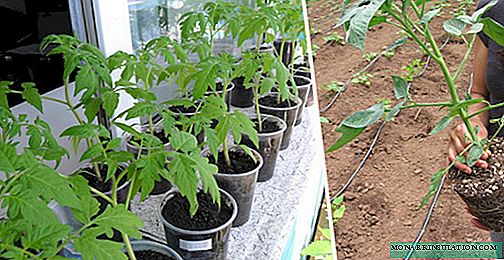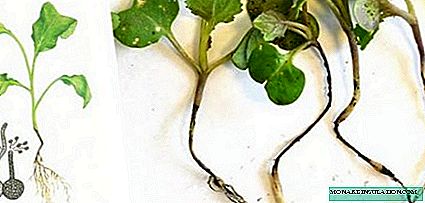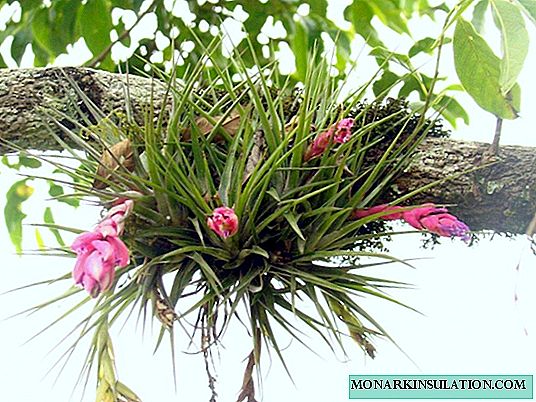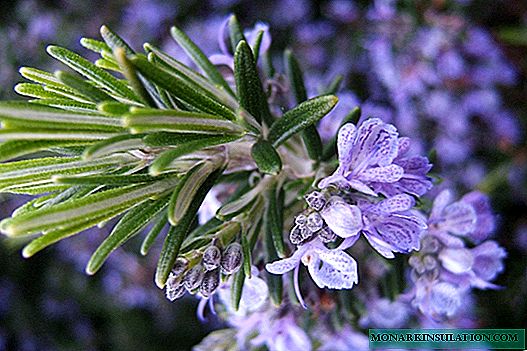Peony Primavera serves as a decoration of the garden from late May to mid June. He has large milky anemone buds. Bushes quickly adapt after planting, unpretentious care.
What kind of variety
Peony Primavera bred more than a century ago. Breeding work was carried out by French specialists. They crossed terry and Japanese peony. Primavera is still very popular with flower growers.
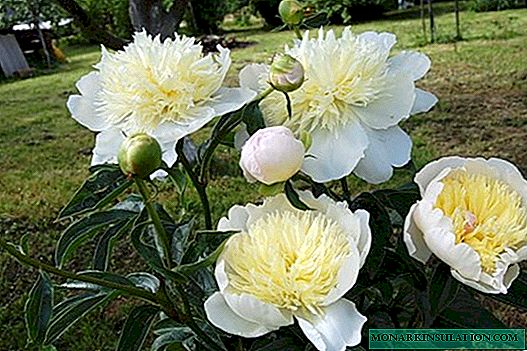
Peony Milky-flowered Primavera
Additional Information!Translated from Italian primavera - "spring".
Description, characteristic
Shoots reach a height of 90 centimeters. Every year on the bush they are growing more and more. The leaves are large, painted with a dark green palette.
The tops of the shoots are crowned with flowers up to 20 centimeters in diameter. They are anemic type. The lower petals are painted white or pale pink. The middle is light yellow.
The buds begin to blossom in late May. Flowering lasts about 3 weeks. In one place, bushes can grow up to 20 years. The variety is frost-resistant, shelter for the winter is not required.
Advantages and disadvantages of the variety
The positive qualities of Primavera include:
- unpretentiousness in leaving;
- early flowering;
- decorativeness;
- frost resistance;
- the ability to use flowers to cut.
Negative qualities include average resistance to diseases and pests.
Use in landscape design
The grassy peony of Primavera is planted singly, in composition with peonies of other varieties. It can be combined with roses, lilies, petunias, phlox, asters. Peony is often made out in the form of a border, planted as a hedge.

Peony Primavera in landscape design
Growing
Planting material is purchased in the garden center from reliable sellers.
Planting with root cuttings
Usually, paeonia is planted with root cuttings. If a bush is already growing on the site, you can dig it out and cut the shoots yourself. Cuttings are planted in prepared wells.
What time is the landing
Peonies are planted in spring or autumn. Experienced gardeners recommend a procedure in September. Then he will well develop the root system and be able to lay flower buds.
Location selection
The territory for planting a peony is selected well-lit by the sun. This should be an open space, or the south side of buildings. When planted in the shade, the crop may not lay flower buds. The site must be protected from cold winds.
Note! Peony is a photophilous plant. Being in the shade, it may not bloom.
How to prepare the soil and flower
The territory is cleaned of plant debris. 2 weeks before planting the bushes, dig a hole. If the soil is poor, humus, superphosphate, wood ash are added to it.
The root system for 2-3 hours is placed in a solution of potassium permanganate. This is necessary for the disinfection of planting material. Then it is placed for several minutes in a growth stimulator.
Landing procedure step by step
Peony is planted as follows:
- dig a hole measuring 60 × 60 × 60 centimeters;
- at the bottom lay out the drainage layer;
- pour nutrient land;
- In the middle put a sapling, fall asleep with soil;
- watered.
The basal circle is covered with mulch. The upper part of the tuber should be below the ground surface by about 6 centimeters.
Seed planting
Florists usually do not use this method of culture propagation. He is laborious. In addition, the qualities stated in the description of the peony of Primavera may not be transmitted. Therefore, the seed method of reproduction is used by breeders to breed new varieties.

Deepening of roots during landing is not allowed
Plant care
Care consists in timely watering, regular top dressing, loosening and mulching of the soil. Faded buds need to be cut, otherwise the peony may not bloom next year.
Watering and feeding
Primevere peony is watered after the topsoil has dried. The procedure is carried out in the morning or in the evening. In hot, dry weather, peonies are watered at least 1 time per week. 10-15 liters of water are poured under each bush.
If peonies were planted in fertile soil, peonies begin to feed on the 3rd year. Organic and mineral fertilizers alternate. The nutrient solution is used according to the instructions on the package.
Important! Fertilize in moist soil. Otherwise, the root system may get burned.
Mulching and cultivation
The soil around the bushes is slightly loosened for air to reach the root system. In this case, weeds are cut, which can be carriers of pathogenic microorganisms and harmful insects.
To preserve moisture in the ground, the root circle is mulched with peat, hay, straw, sawdust. Rotting, substances will serve as additional nutrition for plants.
Preventative treatment
To prevent the appearance of diseases and pests several times during the season, the bushes are sprayed with insecticides and fungicides. To do this, use Topaz, Fitosporin-M, Fitoverm. It must be remembered that treatment with chemicals cannot be carried out during the flowering of plants.
Blooming Peony Primavera
The buds in dissolution reach a diameter of 20 centimeters. The flowers are anemic: the lower petals are painted with a white-pink palette, the middle has a pale yellow color.
Period of activity and rest
Flowering occurs in late May. In the northern regions, buds can begin to bloom in early summer. After flowering, the bushes continue to accumulate nutrients. With the onset of cold weather, a period of rest sets in.
Care during and after flowering
During the dissolution of the buds, peonies are watered, sick, broken shoots are cut. At the beginning of budding, during flowering and after it, mineral fertilizers are applied.
Additional Information! Faded buds are cut to increase the decorativeness of the bush, as well as to help build flower buds for the next year.
What to do if it does not bloom, possible causes
Peonies usually bloom the next year after planting. If this does not happen, the bushes may not have enough sunlight. Flowers may stop forming if the planting is too low or too high. Having eradicated the reasons, the gardener will admire the flowering of peonies for 18-20 days a year.
Peonies after flowering
After the buds dry, the bushes continue to develop. In summer, only flower shoots are cut. All other stems are removed almost to the root in mid-autumn.
Transfer
Bushes older than 6-7 years build up a lot of shoots. As a result, they begin to miss the nutrition area, the flowers grow small. At this age they are divided into parts. Each dividend is transplanted into a separate hole. The procedure is performed in spring or autumn.
Pruning
At the end of June, faded buds are cut. Broken, dry branches are removed throughout the season. Fully cut shoots in October, before the onset of frost.
Winter preparations
Milky-flowered peony Primavere is a frost-resistant culture. She does not need shelter for the winter. In mid-autumn, it is enough to carry out water-charging irrigation. The basal circle can be covered with a low layer of mulch.
Diseases, pests and ways to combat them
If the watering is too frequent and plentiful, the root system of the bushes may become gray rot. For prevention and treatment, Hom or copper sulfate is used.
If there is a large amount of rainfall, and even at a low air temperature, powdery mildew may form on the leaves and stems. In this case, Topaz or Fitosporin is used.
Of the harmful insects, peony can be aphids. By sucking cell sap, it weakens plants.
Worth to know! Get rid of aphids using Fitoverm or Actellik.
Primavera is a milky flowering peony variety. Caring for it is simple. Even a beginner can grow it. Plants need to be watered in a timely manner, fed, cut off faded buds. Starting from the age of 6, peony is propagated by dividing the bush.


